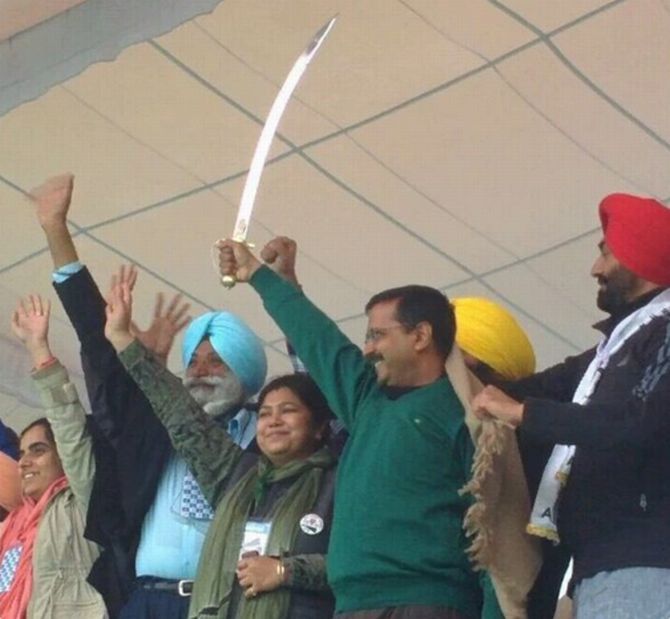Punjab's voters are dissatisfied with the Akali Dal-BJP ruling combine.
The Congress does not have a strong agenda on which to fight the assembly polls -- fertile ground for the AAP to step in, reports Komal Amit Gera.

With battle lines drawn for the 2017 assembly elections in Punjab, the emergence of the Aam Aadmi Party on the state's political landscape is giving jitters to both the Shiromani Akali Dal-Bharatiya Janata Party alliance and its traditional rival, the Congress.
A political storm is building up. Farmers' protests, road and railway blockades and no-entry boards for all political parties at the entry points of villages are testimony to the dissatisfaction of the electorate.
A journey through rural and urban Punjab tells a story of declining incomes and growing indebtedness. Agriculture and industry, both are victims.
Rural pockets of Punjab, the major vote banks of the ruling SAD, are clear about not voting the Badal family back to power.
In the past nine years, despite increase in yield, the average income of farmers has dwindled. They kept investing in mechanisation of agriculture -- buying tractors, paddy harvesters, seeders and deepening tubewell bores —without a matching increment in income. The outcome is huge indebtedness.
A recent study conducted by the Indian Council of Social Science Research corroborates the extent of agricultural indebtedness in Punjab: Up to Rs 69,355 crore (Rs 693.55 billion).
The debt per household for a marginal farmer having a landholding of 2.5 acres or less is about Rs 2.57 lakh (Rs 257,000), says the study. A large number of landless farmers are in the grip of private moneylenders.
Jagtar Singh Brar, a farmer in Mehma Sarja village of Bathinda district, does not want his 22-year-old son to take up his profession because it has become a loss-making proposition. But there is little for his son to do: There has been no job creation in Punjab. Jobless youth are another cause of worry for traditional political parties.
"Punjab farmers know how to grow more but never learnt how to market what they grew," Brar says. "They got entrenched in wheat-paddy cultivation to fill the government's grain stores, which stopped paying dividends gradually. The risk-taking Punjab grower kept working to increase yields and this boomeranged on him. He is unable to cut expenses. And as incomes plunge, suicide is the answer."
The rural voter, he says, is looking for a new political outfit that can provide a corruption-free and farmer-friendly government.
A senior farmers' leader from Amritsar, Ratan Singh Randhawa, says that resentment among farmers is at its height. The Congress has been unable to highlight the growth of narcotic traders in Punjab.
Strong anti-incumbency may put the ruling alliance on a weak footing, but the Congress, too, has not played a constructive role as an Opposition in the last nine years. The Congress leader, Captain Amarinder Singh, commands respect among voters, but does not have a strong agenda to lead the race.
The Congress, according to psephologists, may emerge as a formidable contender in the final course of events if it is able to touch the right chord with the voters.
The AAP, too, does not have a strong agenda. Arvind Kejriwal launched the party's election campaign at the Muktsar Maghi Mela this month. But he did not touch upon the issues at the heart of Punjab's economic and social discontentment.
The organisational structure of the AAP is firming up. Although it is not as strong as the ruling or the Opposition parties in Punjab, it is taking advantage of the chinks in the armour of traditional players.
It is learnt that in Mehma Sarkari village in Bathinda district, 800 voters out of a total of 1,200 on the electoral rolls, voluntarily registered with the AAP recently. While the young voters said they would vote for the AAP, the older ones conceded it was a party worth giving a chance to.
The Bathinda belt has been the bastion of the Badal family and all of them -- Parkash Badal, chief minister of Punjab; Sukhbir Singh Badal, deputy chief minister; and Harsimrat Kaur Badal, the Union food processing minister, represent this region.
Incidents of religious sacrilege also alienated the dedicated Panthic vote bank of the SAD. The Badal family, say voters, rules as despots. "We cannot access any of the elected representatives, and cannot meet government officials directly. We have to address our complaints to the halka (clusters of villages)," says a farmer from Bathinda.
Investments in infrastructure (road and power) over the past 10 years seem to hold no meaning for voters. "This is the way they (the ruling party) earned its commissions and obliged corporate houses," said a farmer, who did not want to be named.
While rural and urban voters agree that the AAP has not been able to achieve anything significant from its stint in Delhi, they also concur that while Kejriwal might be inexperienced, he is not corrupt. They want a change of guard and want the AAP to sharpen its focus.
Urban voters say industry is in a shambles; the question is how it can be revived. But time is running out for the AAP: The party does not yet have a face to project as its chief ministerial candidate in Punjab.
Voters in rural Punjab say the AAP is not the panacea for the complex social and developmental problems faced by the state. At the same time, they believe nothing could be worse than the current crisis in the state and feel the AAP can be tried out as a remedy to address the disease in Punjab's social and economic fabric.











